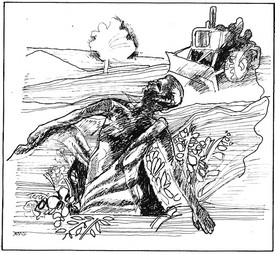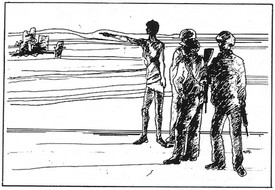
The Village That Morning
by Akram HaniyaAbu Mahmoud Al Qasimi became aware of an unusual noise. He opened his eyes slightly, listened quietly, and then closed them, expecting silence to prevail once more. But the noise outside began to grow louder. "Even the dead can't sleep peacefully," he grumbled.
Abu Mahmoud began to untie the bands of the shroud, with the intention of finding out the reason for the noise. His freed hands stretched out to push his way up to the surface of the ground. The noise became increasingly violent and tumultuous as Abu Mahmoud's hands pushed aside more of the piled up earth.
The biting cold of the morning struck against his face as soon as he poked his head out of the grave. He found himself covering his eyes with his hands as they encountered bright sunlight, to which they had been unaccustomed since Qasimi had died twenty years earlier.
After a few moments he was able to look around him. He looked towards the east and saw the houses of his village lying peacefully on the hillside. Memories poured over him in successive waves, and he whispered nostalgically, "This is Abu Adnan the Mayor's house, and this is Shaikh Abu Sufyan's house in front of the mosque. But... Where's my house?" The increasing loudness of the noise snatched him from his reverie. He looked inthe other direction and saw a massive bulldozer spreading its great iron jaw over the graveyard, sweeping away the simple tombstones and the bones of the dead on its way.
Astonishment overcame Abu Mahmoud. He opened his mouth intending to cry out, but the voice which had not uttered anything for 20 years came out faintly so nobody heard it. "What's going on? How can you violate the sanctity of graveyards?" He looked searchingly into the face of the driver of the bulldozer and gazed at a round white face topped by fair hair, a man in his thirties dressed in shorts and a shirt whose top buttons were undone. The man was carrying out his work on the bulldozer calmly, his lips holding a cigarette which he followed with another one when it went out.

|
His gaze reverted to the village. There was calm and silence like the silence of a graveyard prevailing over the haphazardly scattered houses. "The men shouldnow be on their way to the fields and the children on their way to school," he thought. "What has brought this man here? And what's he doing with his bulldozer in the graveyard of our village? How can he violate the sanctity of the dead?"
A wave of strange, deep sorrow overcame Abu Mahmoud, but he had determined to do something. He began wrapping the cloth of white shroud around his body and under his armpits and started walking towards the driver of the bulldozer to ask him what was happening. He found a difficulty in moving his legs, which had become become used to a horizontal position for twenty years in the grave, when he began to step slowly towards the man, who was continuing his work a few metres away from Abu Mahmoud without seeing him.
A few moments later a storm of dust appeared, rising form the road which ran parallel to the village and led to the graveyard. It revealed a convoy of military and civilian vehicles which parked near the bulldozer. Abu Mahmoud stopped walking then and hid behind one of the tombstones to wait and see what would happen.
They all alighted from their vehicles. Their features were strange. "They're not people from our village," Abu Mahmoud whispered. They stood beside the bulldozer. He did not know any of them, but they were all there: the men from the military government, the border guards, Keren Kayemet (the Israeli Lands Department - the ed.) officials, Gush Emunim men, journalists and others.
The situation was too difficult for Abu Mahmoud to understand and too heavy for him to bear. "It's my village," he said, "my grave, the graves of my relatives and ancestors. I must know what's going on." He came out from behind the tombstone and headed with angry steps towards the group.
The first person to notice the movement of th eman who had emerged from the grave was a soldier who started shouting loudly at the sight of a man earing the smell, colour and clothing of death. Everyone turned towards the advancing man. Astonishment prevailed for a few moments, then some of the regained their composure and the frontier guards pointed their machine guns at the man and the voice of one of them rang out: "Halt!"
Abu Mahmoud realised that the tongue which spoke the order was a foreign one, but he stopped. The soldiers advanced towards him cautiously, their eyes fixed on his every limb, and formed a circle round him like a bracelet.
A military man who appeared to be the senior on in rank came forward and shouted at Abu Mahmoud: "Who are you?"
"And who are you?" Abu Mahmoud replied calmly.
"I'll ask the questions and you'll answer."
"I'm Abdullah Khalil Al Qasimi."
"From where?"
"From this village."
"Where's your identity card?"
"My identity card? What identity card?"
"What are you doing here?"
"I was dead in my grave, and the noise of the bulldozer woke me."
A murmuring arose and glances of fear and astonishment hovered between the people standing there, until the soldier resumed his questioning of Abu Mahmoud.
"You're insane. I said, what are you doing here?"
"I'm not insane. Who are you and what are you doing here?"
"We are representatives of the state of Israel."
The reply stunned Qasimi. He was silent for some moments, and then pulled himself together, and shouted: "And why are you bulldozing the graveyard? This is a sin."
"It's our land."
"Your land? All my ancestors are buried here."
"It's our land and we're going to build a settlement on it."
"But..."
The conversation was interrupted by the sound of the motor of a military jeep approaching the graveyard. Everyone gazed towards it attentively. When it stopped, a man in his fifties dressed in military uniform alighted. He was the military governor of the area.
The newcomer sensed something strange in the atmosphere. He searched for the answer in people's eyes, and was shocked to see the man wrapped in death shrouds standing among the gathering with anger blazing from his eyes. The governor exchanged a brief conversation with the man who had been questioning Abu Mahmoud and obtained a full summary of everything that had happened. A faint smile appeared on his lips, then his face took on a serious expression and he went up to Abu Mahmoud and asked him, "Were you born in this village?"
"Yes."
"When did you die?" Abu Mahmoud needed time to answer. "Five or six years after the exodus"
"Where were you in the year of the exodus?" the governor asked him.
"I was here in my village."
"Didn't you leave it in those days?"
Abu Mahmoud hesitated, and then replied hastily, "No."
The governor paused a while, before uttering the words slowly and calculatedly: Didn't you defend your country and your people?"

|
"Of course," he blurted out vehemently. "I fought the English and the Jews. I had a rifle which I inherited from my father. I fought at Yaabad and Bab Al Wad and was famous for my courage."
The words rushed out like bullets from Abu Mahmoud's mouth. Things had become clear to him now, and the flood of old memories poured over him, mingled with nostalgia and bitterness, but everything stopped when the governor, sensing that he had found a rare treasure, shouted out: "Ha! So you're an old saboteur."
"Saboteur?"
"Shut up. Where's the rifle? Where have you buried it?"
"It's old. My father got it from the Turks when he fought in Yeman."
"Where did you hide it?"
"It's... It's buried beside the olive tree in front of my house."
"Where's your house?"
"My house? Ah... It was next to the mosque, but... it's disappeared. What have you done with it?"
A man who had been standing at the back of the group came forward, whispered some words in the governor's ear and then turned towards Abu Mahmoud and asked him, "What's your full name"
"I told you. Abdullah Khalil Al Qasimi."
"Have you got a son called Kamal?"
Abu Mahmoud's heart leaped in anxiety, his body shook. "Yes," he shouted. "He's my youngest son, and my favourite child. What's happened to him?"
The man raised his voice. "We've blown up the house. Kamal's a saboteur."
"My house!" Abu Mahmoud shouted, "What's happened to Kamal?"
"He's in prison."
The words stunned Abu Mahmoud. He shouted loudly and advanced towards the governor, shaking his fists, to which emotion and anger had restored a vitality they had lost for twenty years, but the soldiers seized him and pulled him back.
The usual silence prevailed over the graveyard except for Abu Mahmoud's groans. "If we imprison him, it'll create a problem," the military governor thought. "How can we imprison a man who's come out of the grave. And the bulldozers will remove the graveyard, so we can't put him back there. What are we to do with him?"
One of the governor's aides came up to him, sensing his perplexity, and whispered in his hear, "We'll deport him to Jordan."
Four men hastily led Abu Mahmoud off and, despite his protests and shouts, threw him into the back of a jeep which drove off eastwards at high speed.
On the bank of the river of tribulation, the vehicle stopped. The soldiers took Abu Mahmoud with them until they came near a ford where it was easy to cross to the other side of the river.
"Cross to the other bank," the soldiers shouted at Abu Mahmoud.
The shout aroused him from the stupor which had gripped him for the whole journey. Thousands of images flashed successively through his mind: Kamal... the house... Umm Mahmoud... the olive trees... the rifle... Yaabad... the forests... Bab Al Wad... He looked around him. A sudden idea flashed into his mind. He advanced towards the river bank, looked around him once more and saw the soldiers gesturing to him to cross to the other side. He also saw the hills and trees covered with the rays of the morning sun. His enthusiam for what he intended grew. He went forward with confident steps, murmured some words to himself, tears flowing from his eyes, and then hurled himself towards the river.
A few moments later, the waters of the holy river were carrying Abu Mahmoud Al Qasimi's body with them as they flowed, full of power and life, to pour into the Dead Sea.
Contact us: New Jersey Solidarity - Activists for the Liberation of Palestine
(973) 954-2521
info@newjerseysolidarity.org
http://www.newjerseysolidarity.org
New Jersey Solidarity
344 Grove Street, Suite 131
Jersey City, NJ 07302